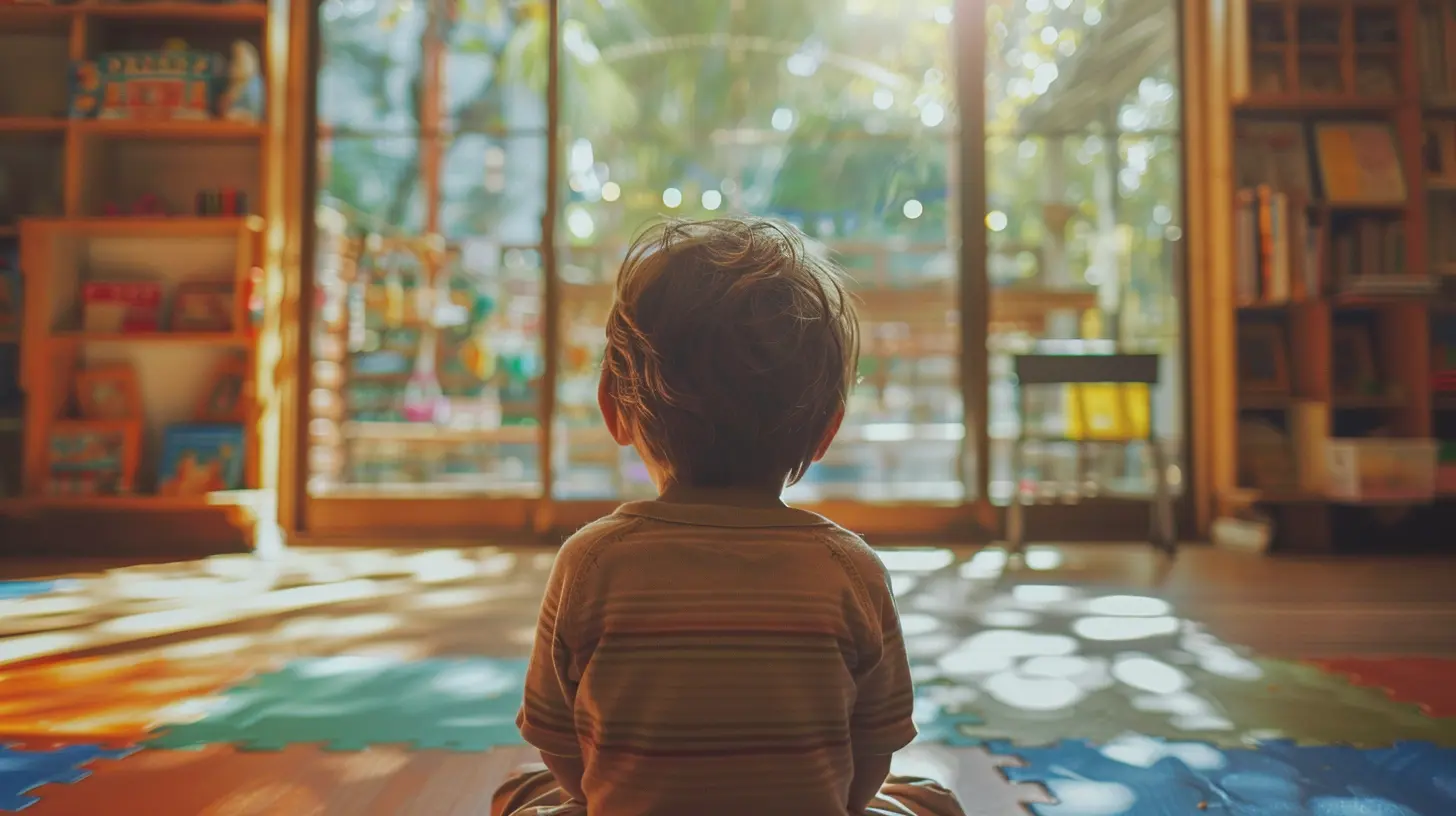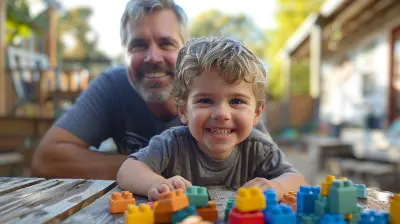Encouraging Independent Thinking in Young Children
22 February 2025
As parents, we want our kids to grow up confident, capable, and self-reliant. But how do we help them develop these skills? One of the most effective ways is by encouraging independent thinking in young children. Independent thinking empowers kids to make decisions, solve problems, and trust in their abilities—all crucial skills for lifelong success.
But here's the question: how exactly do we nurture these traits in our little ones without stifling their creativity or frustrating their natural curiosity? In this article, we'll dive deep into practical strategies and tips to encourage independent thinking in your children while making the process fun and engaging for the whole family!
What Is Independent Thinking?
Before we jump into the "how," let’s define independent thinking. Simply put, it’s the ability to think for oneself. An independent thinker can analyze information, form opinions, make decisions, and solve problems without being overly reliant on others.Imagine this: Your child is like a sponge, absorbing everything around them. While they benefit from learning through observation and instruction, it’s crucial to guide them to question, reflect, and make their own choices instead of solely mimicking what they see.
Independent thinking isn't about teaching kids to always go against the grain. Instead, it encourages them to weigh the facts, use logic, and consider different perspectives before reaching conclusions. And yes, it's something we can start nurturing in our kids from a very young age.
Why Is Independent Thinking Important?
You might be asking, “Why should I encourage independent thinking in my child?” Well, the benefits are enormous, and they stretch far beyond childhood.Independent thinkers are more adaptable, resilient, and creative when faced with challenges. They become problem-solvers, critical thinkers, and strong decision-makers. Plus, they’re less likely to be swayed by peer pressure or follow trends blindly. And as they grow, the ability to think for themselves helps them navigate life's inevitable ups and downs with confidence.
Let’s not forget: the world is an ever-changing place. Teaching your child to think independently helps them better adapt to future uncertainties. But building these skills takes practice, patience, and some intentional parenting.
How to Foster Independent Thinking in Young Children
Now that we've covered the "what" and "why," let’s dig into the "how." Below are practical strategies you can implement to encourage independent thinking in your young children.1. Let Them Solve Simple Problems
It’s incredibly tempting to step in whenever your child encounters a problem, right? Whether they’re struggling with a jigsaw puzzle or can’t figure out how to tie their shoes, it’s in our nature to want to help. But here's the thing—you’re doing them a disservice if you always come to the rescue.Instead, let your child try to solve the problem on their own first. Ask guiding questions such as, “What do you think you should do next?” or “How could you try a different approach?” Resist the urge to give them the answers outright. This builds both their problem-solving skills and boosts their confidence.
Pro-Tip:
Create a "problem-solving box" filled with various puzzles, brain games, and challenges. Encourage your child to spend some time each day solving a puzzle. This simple trick fosters persistence and critical thinking.2. Encourage Open-Ended Questions
Asking open-ended questions is one of the most straightforward and effective ways to engage your child’s independent thinking. Open-ended questions allow them to think about possible answers without the fear of being "right" or "wrong."Instead of asking, “Did you have fun at school today?” try asking, “What was the most exciting part of your day and why?” A question like this encourages deeper thinking, reflection, and expression of personal opinions.
Example Open-Ended Questions to Encourage Independent Thinking:
- "What would happen if we did this differently?"- "Why do you think that happened?"
- "How can we solve this problem together?"
By making curiosity a natural part of your conversations, you’ll teach your child how to explore ideas, analyze situations, and come up with thoughtful conclusions.
3. Offer Choices (But Not Too Many)
Offering choices empowers your child to make decisions—a key component of independent thinking. But don't overwhelm them with too many options. For younger children, offering two or three choices works best. For example:- “Do you want to wear the blue shirt or the red shirt today?”
- “Would you like to read a storybook or color?”
Making choices helps children understand the consequences of their decisions and gives them a sense of control. As they grow, you can offer more complex choices, encouraging them to think through various outcomes before making a final decision.
4. Allow Room for Mistakes
Let’s face it: we all hate to see our kids make mistakes. But if there's one thing we can all agree on, it’s that mistakes are where some of the best learning happens. When your child messes up, resist the urge to scold or immediately correct them. Instead, view the mistake as a valuable learning opportunity.Simply ask, “What can we learn from this?” or “How would you do it differently next time?” This approach not only takes the sting out of failure but also teaches your child that it’s okay to stumble as long as you learn and grow from the experience.
This builds resilience—an essential trait for independent thinkers who understand that failure is not the end, but part of the journey to success.
5. Model Independent Thinking Yourself
Kids are like sponges—they absorb more than we realize. So, if you want your child to be an independent thinker, model this behavior in your own life. Discuss your decision-making process openly with your child. For example, if you're deciding what to cook for dinner, say:“I’m thinking about making pasta for dinner, but I’m also considering stir-fry because we had pasta yesterday. What do you think we should do?”
By letting them see how you weigh options and think critically, they’ll learn how to apply the same method to their own decisions.
6. Encourage Creative Play
Sometimes, the best ideas come when we’re just having fun. Encourage your child to engage in playtime activities that stimulate imagination and promote independent thinking. Puzzles, building blocks, role-playing games, and art projects are great ways for your child to explore different strategies and make their own decisions.In fact, when children engage in unstructured play, they practice decision-making, problem-solving, and creative thinking—all key components of independent thought.
Pro-Tip:
Introduce games that rely on deductive reasoning or strategy, like “Guess Who?”, “Chess,” or even scavenger hunts. These can subtly teach your child how to think strategically and explore multiple outcomes.7. Celebrate Their Unique Ideas
We all want to feel heard and valued, and children are no different. When your child shares their thoughts or ideas with you, listen attentively. Even if their idea seems impractical or a little out there, celebrate their creativity. This encourages them to keep sharing their ideas instead of second-guessing themselves.Remember, independent thinking isn’t just about coming up with the “right” answer. It’s about fostering a mindset that values exploration, curiosity, and innovation.
8. Make Learning Fun and Hands-On
Young children are natural explorers. They learn best when they can physically experiment, observe, and engage their senses. Encourage hands-on learning opportunities where your child can investigate for themselves. From science experiments to gardening to baking—learning by doing reinforces independent thinking.For example, instead of reading about plants, engage them in planting a small herb garden. Let them figure out how much water is needed and observe the growth. This direct involvement encourages them to think critically about the process and understand the outcomes of their actions.
9. Let Them Lead
It can feel strange to let your child take the reins, but allowing them to be the leader in certain situations can significantly boost their confidence in their independent thinking abilities. Let them choose a family activity for the weekend, plan a fun dinner, or even lead you through a made-up game.When they get the chance to take charge, they start building leadership skills and are more inclined to think through their decisions carefully.
Common Challenges in Encouraging Independent Thinking
Of course, fostering independent thinking isn’t without its challenges. Sometimes kids can get frustrated when they can’t figure out a problem, or they might resist making decisions in favor of sticking with what they know. Let’s acknowledge a few common roadblocks and how to overcome them.1. Fear of Failure
Children may hesitate to think independently for fear of getting something wrong. Reassure them that mistakes are okay and part of the learning process. You can even share some of your own mistakes and the lessons you learned from them.2. Overwhelm
Sometimes giving too much freedom can overwhelm children. Start by giving them small, manageable challenges, and gradually offer more complex choices as they grow older and more confident.3. Time and Patience
Let's be honest—encouraging independent thinking often requires more time than simply doing things for them. But trust me, it’s worth the investment. Practice patience, and remember that small steps can lead to big gains over time.Conclusion
Encouraging independent thinking in young children isn’t a one-size-fits-all approach, but it’s one of the most valuable gifts we can give them. By allowing them room to explore, fail, and succeed, we’re building the foundation for resilient, curious, and confident individuals. And yes, it takes time, patience, and a willingness to sometimes step back—but the payoff is well worth it.Remember, the goal isn’t to raise a child who always knows the right answer but one who is unafraid to seek it out for themselves. So, let them think, let them fail, and most importantly, let them imagine all the possibilities.
all images in this post were generated using AI tools
Category:
Building ConfidenceAuthor:

Zelda Gill
Discussion
rate this article
8 comments
Macey Newman
What a fantastic read! Fostering independent thinking in our little ones is such a joyful journey. Let's empower their curious minds! 🌟
March 13, 2025 at 5:40 PM

Zelda Gill
Thank you! I'm glad you enjoyed it. Empowering curiosity in our children truly is a rewarding experience! 🌟
Sarina McClendon
Teaching kids to think for themselves is like giving them a magic wand—one moment they’re casting spells of creativity, and the next, they’re negotiating with their toys! Remember, though: even wizards need a few mishaps to learn. Let the curious chaos begin!" ✨🧙♂️🚀
March 11, 2025 at 3:20 AM

Zelda Gill
Absolutely! Embracing the chaos of creativity is essential for growth. Independent thinking empowers kids to explore, learn from mistakes, and truly discover their magic! ✨
Eli Holland
Empowering our children to think independently fosters creativity and resilience, equipping them for a future full of challenges and opportunities.
March 8, 2025 at 5:24 PM

Zelda Gill
Absolutely! Encouraging independent thinking not only sparks creativity but also builds resilience, preparing our children to navigate future challenges with confidence.
Fleur McEvoy
Absolutely love this topic! Encouraging independent thinking in our little ones helps them blossom into confident, creative problem-solvers. Let’s nurture their curiosity and watch them shine! 🌟💖
March 7, 2025 at 4:39 PM

Zelda Gill
Thank you! I completely agree—nurturing curiosity is key to building confident, creative thinkers. 🌟
Atlas Jackson
Encouraging independent thinking in kids is like teaching them to ride a bike—sure, they might wobble and crash a few times, but when they finally zoom off on their own, it’s a ride worth cheering for (and perhaps filming)!
March 7, 2025 at 3:27 AM

Zelda Gill
Absolutely! Just like bike riding, nurturing independent thinking in kids helps them gain confidence and resilience, making their journey truly rewarding.
Callista Vance
Thank you for sharing these insightful strategies! Encouraging independent thinking in our children is so vital for their growth and confidence. I appreciate the practical tips you've provided; they inspire us to foster an environment where curiosity thrives. Let’s nurture their unique perspectives together!
March 2, 2025 at 4:02 AM

Zelda Gill
Thank you for your thoughtful comment! I'm glad you found the tips helpful in fostering curiosity and independent thinking in children. Together, we can support their growth and unique perspectives!
Shelby Barker
Encouraging independent thinking in children nurtures their confidence and creativity. Providing opportunities for exploration and gently guiding their decisions fosters resilience and critical problem-solving skills.
February 25, 2025 at 3:46 PM

Zelda Gill
Thank you for your insightful comment! I completely agree—encouraging independent thinking is crucial for building confidence, creativity, and essential life skills in children.
Bennett McClendon
Great tips! Encouraging our kids to think for themselves not only boosts confidence but also prepares them for real-world challenges.
February 24, 2025 at 5:57 PM

Zelda Gill
Thank you! I completely agree—fostering independent thinking in our kids is essential for their confidence and problem-solving skills in the real world.
MORE POSTS

The Power of Play in Your Homeschool Routine

Recognizing and Managing Newborn Skin Conditions

Setting Realistic Expectations for Your Teen’s Future

Navigating the Emotional Transition from One Child to Two

Flexibility in Parenting: When and How to Modify Your Approach

Taming Morning Chaos: A Positive Parenting Routine for Success